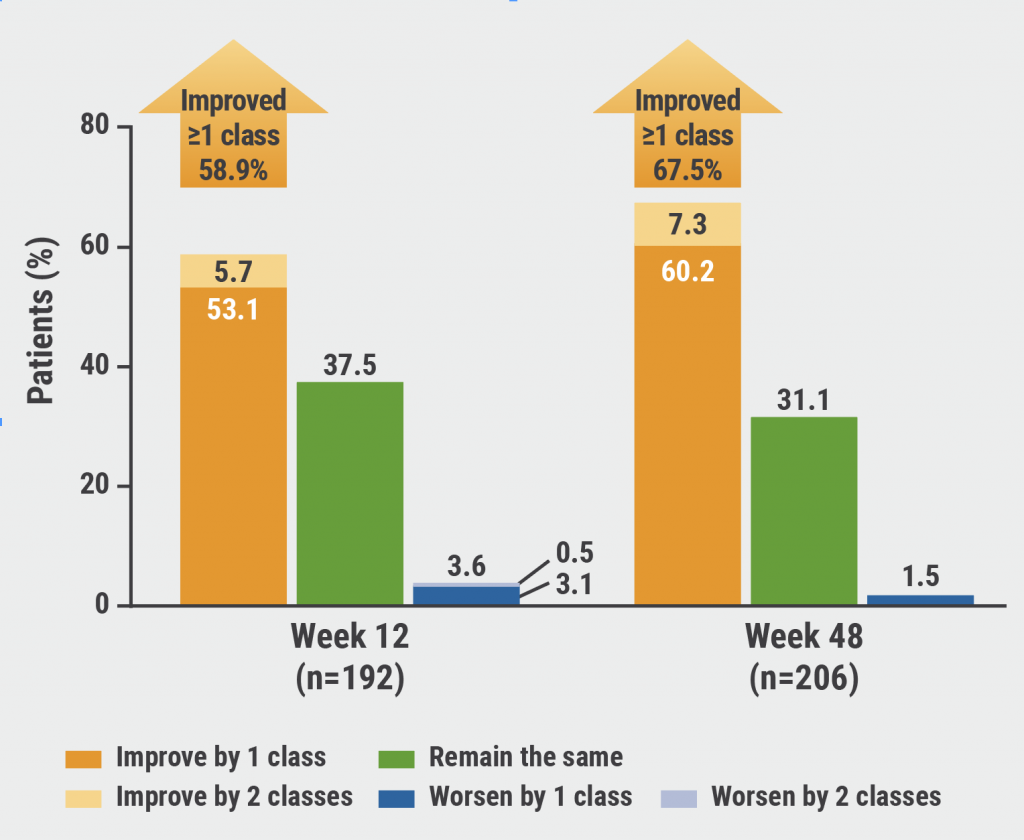https://doi.org/10.55788/c1948088
Prof. Adam Greenbaum (Emory University School of Medicine, GA, USA) presented the first interim results of the CLASP TR study [1]. CLASP TR is a prospective, single-arm, multicentre study (NCT03745313) designed to evaluate the safety and performance of the PASCAL transcatheter valve repair system in patients with symptomatic severe TR [2]. The primary endpoint was the composite of major adverse events at 30 days, with follow-up at 6 months, 1 year, and every year thereafter until 5 years [2]. The analysis presented by Prof. Greenbaum was limited to the follow-up results at 1 year. The primary outcome of CLASP TR was safety, namely lack of adverse events from either the device or procedure. Key secondary events were improvement in reduction in TR grade, New York Heart Association (NYHA) Classification, the 6-minute walk test, and QoL.
Of the 65 patients who received the PASCAL transcatheter valve repair system, only 46 had complete 1-year follow-up data, as a result of the COVID-19 pandemic. Among those 46 individuals, 7 (10.8%) had died, 12 (18.5%) were rehospitalised for heart failure, and 11 (16.9%) had experienced a major adverse event. All 46 patients (100%) achieved a reduction of at least 1 grade in their TR severity, with 75% seeing a reduction of at least 2 grades and 86% achieving an overall grade of moderate or less. Significant improvements were also seen in heart failure severity, the 6-minute walk test, and patient-reported QoL.
“At 1 year of follow-up, the repair procedure appears to be safe and significantly reduced the severity of patients’ TR and improved their ability to function in daily life, maintaining gains that we previously saw at 30 days of follow-up.” The study limitations were low treatment numbers and an absence of a comparator group. The randomised CLASP II TR trial will compare outcomes for patients treated with the PASCAL and those receiving optimal medical therapy with diuretics.
- Greenbaum AB, et al. Transcatheter Treatment Of Tricuspid Regurgitation: One-year Results Of The Clasp TR Study. Abstract 409–12, ACC 2022, 2–4 April, Washington DC, USA.
- Kodali S, et al. J Am Coll Cardiol. 2021;77(4):345–356.
Copyright ©2022 Medicom Medical Publishers
Posted on
Previous Article
« Head-to-head: post-TAVR edoxaban not better than DAPT Next Article
Plot twist for negative FAME 3 results: early QoL benefits of PCI »
« Head-to-head: post-TAVR edoxaban not better than DAPT Next Article
Plot twist for negative FAME 3 results: early QoL benefits of PCI »
Table of Contents: ACC 2022
Featured articles
Alirocumab significantly reduces high-risk coronary plaques
Highlighted Original Research
POISE-3: Tranexamic acid for non-cardiac surgery
Treating chronic mild hypertension during pregnancy leads to better outcomes
New VOYAGER PAD data: Should patients with both PAD and CKD get rivaroxaban?
Alirocumab significantly reduces high-risk coronary plaques
Aggressive warming during non-cardiac surgery does not improve outcomes
Heart Failure and Cardiomyopathy
DIAMOND trial: Patiromer lowers risk of severe hyperkalaemia
Replacing septal reduction therapy with mavacamten for HCM
Omecamtiv mecarbil does not impact exercise capacity of patients with HFrEF
Symptomatic obstructive hypertrophic cardiomyopathy: long-term mavacamten control
Interventional and Structural Cardiology
COMPLETE revascularisation improves angina-related QoL
Plot twist for negative FAME 3 results: early QoL benefits of PCI
1-year CLASP TR results support tricuspid regurgitation repair
Head-to-head: post-TAVR edoxaban not better than DAPT
Chocolate Touch vs Lutonix catheters
No FLAVOUR difference between FFR and IVUS for PCI guidance
Myocardial Infarction
Low-resource countries benefit from global STEMI initiative
Sodium thiosulfate ineffective at cardiac protection
ICM-guided management did not improve MACE after MI
Prevention
PACIFIC-AF: Low bleeding rates for asundexian in atrial fibrillation
RCT-IVVE trial: Do HF patients benefit from annual flu shots?
TRANSLATE-TIMI 70: Primary endpoint met but safety concerns for vupanorsen
Lipoprotein(a) slashed by 98% in APOLLO trial
Dietary intervention from your supermarket
Related Articles
June 15, 2022
Lipoprotein(a) slashed by 98% in APOLLO trial

April 20, 2022
ACC 2022 Highlights Podcast

© 2024 Medicom Medical Publishers. All rights reserved. Terms and Conditions | Privacy Policy

